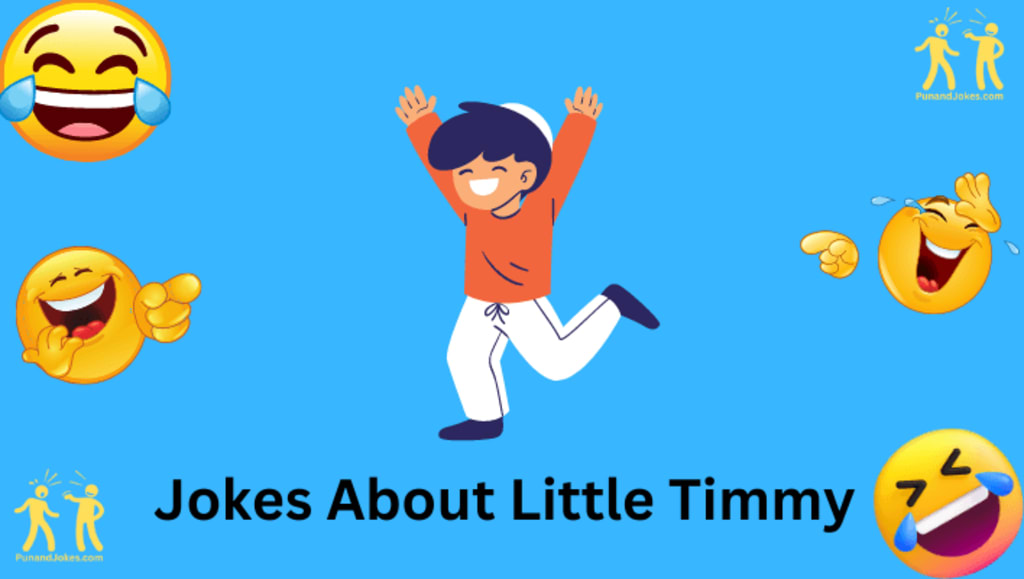The Power of Laughter
How Kids Jokes Influence Child Development

Jokes hold an incredible power to uplift spirits, and for kids, they play a profound role in shaping their development and well-being. The impact of kids jokes extends far beyond simple amusement; it encompasses a myriad of cognitive, emotional, and social benefits that contribute to their growth and learning. Let's delve deeper into the influence of kids jokes and why they are a vital tool in nurturing happy and well-rounded individuals.
1. Fostering Cognitive Development
Engaging with jokes involves deciphering wordplay, understanding punchlines, and recognizing the nuances of language. These cognitive processes stimulate young minds, enhancing critical thinking, problem-solving, and creativity. Kids learn to connect various pieces of information and make sense of the humorous content, thereby sharpening their mental acuity.
As children listen to and share jokes, they actively engage in decoding language puzzles. They observe patterns, identify similarities between words, and grasp subtle humor. For example, puns rely on the multiple meanings of words, and as children comprehend these nuances, they hone their linguistic skills.
Additionally, joke-telling encourages memory retention and recall. As children memorize and deliver jokes, they exercise their memory muscles, which contributes to better learning and academic performance. The act of memorization reinforces neural connections and enhances cognitive abilities.
2. Improving Language Skills
Kids jokes are an effective vehicle for language development. Listening to and telling jokes expose children to new words, phrases, and linguistic patterns. This exposure enriches their vocabulary, improves sentence construction, and hones their communication skills. As they experiment with humor, kids become more confident speakers and adept storytellers.
By grasping the elements of humor, children learn to use language creatively. They play with words, explore different tones and deliveries, and understand the importance of timing and context. This linguistic dexterity extends beyond jokes, enabling children to express themselves more effectively in everyday conversations.
Furthermore, jokes break down language barriers and facilitate communication in diverse settings. Whether children share jokes with peers from different cultural backgrounds or engage with family members of varying ages, humor serves as a common ground that fosters inclusivity and understanding.
3. Nurturing Social Bonds
Sharing jokes with peers and family fosters a sense of connection and camaraderie. Humor is a universal language that brings people together, transcending cultural and language barriers. In social settings, kids who engage in light-hearted banter and joke-telling tend to attract friends and create positive group dynamics.
Jokes serve as icebreakers in new environments, easing social interactions and making children more approachable. By participating in joke-telling with others, kids learn to read social cues and respond appropriately. This social competence is crucial in building strong interpersonal relationships and forming meaningful friendships.
Moreover, humor plays a role in teamwork and collaboration. In group settings, children who use humor to lighten the mood and encourage camaraderie contribute to a positive and cohesive atmosphere. This sense of unity enhances group productivity and overall satisfaction.
4. Cultivating Emotional Intelligence
Kids jokes often revolve around emotions and relatable situations. By laughing at humorous scenarios, children develop emotional intelligence as they learn to understand and express feelings. This emotional literacy enhances their empathy and compassion towards others, making them more socially adept and considerate individuals.
Through humor, children explore emotions such as joy, surprise, and empathy. As they identify with characters or situations in jokes, they gain a deeper understanding of human emotions and reactions. This empathy not only enriches their social interactions but also strengthens their emotional resilience.
Furthermore, jokes provide a safe space for children to cope with their emotions. In challenging or stressful situations, humor can serve as a healthy coping mechanism, allowing kids to find lightness and positivity amidst difficulties.
5. Encouraging Resilience
In the face of life's challenges, humor becomes a powerful coping mechanism. Kids who appreciate jokes learn to find lightheartedness in difficult situations, boosting their resilience. The ability to see the lighter side of life helps them navigate stress with a positive outlook and adapt to changing circumstances.
By experiencing humor, children understand that setbacks and disappointments are a part of life, but they need not define their overall happiness. This resilience equips them with the mental strength to bounce back from adversity, fostering a growth mindset that enables them to persevere in various aspects of life.
Moreover, humor can diffuse tense situations and reduce conflict. In family or school settings, children who use humor to lighten the mood can ease disagreements and promote resolution in a constructive manner.
6. Boosting Confidence
Participating in joke-telling sessions or delivering punchlines builds children's self-confidence and public speaking skills. As they stand in front of an audience and evoke laughter, they experience a sense of accomplishment and pride in their abilities.
Confidence in joke-telling extends to other areas of communication, such as presentations and storytelling. Children who develop a flair for humor often become effective communicators, capable of engaging and captivating their listeners.
Furthermore, the positive feedback received when sharing jokes reinforces children's self-esteem. As they receive laughter and appreciation, they develop a healthy sense of self-worth, which is fundamental to their emotional and psychological well-being.
7. Promoting Creativity
Creating and sharing original jokes nurtures children's creativity. They experiment with wordplay, unexpected connections, and playful imagery, fostering their imaginative thinking. This creative expression spills into other aspects of their lives, inspiring inventive problem-solving and innovative approaches to challenges.
When children invent their jokes, they exercise their imaginative faculties and explore the limits of their creativity. This imaginative play not only enhances their cognitive development but also provides a source of endless fun and amusement.
Moreover, creative humor encourages children to think outside the box and consider multiple perspectives. As they craft jokes, they learn to view situations from different angles, fostering a flexible and open-minded approach to life.
8. Enhancing Learning
Humor can be an effective teaching tool, making learning enjoyable and memorable. Educational jokes and puns related to various subjects can help reinforce lessons and concepts, making learning a delightful experience.
By incorporating humor in educational settings, teachers can create an engaging and interactive classroom environment. Children are more likely to pay attention and retain information when they associate learning with enjoyment and amusement.
Furthermore, humor stimulates curiosity and a thirst for knowledge. As children find joy in humorous learning experiences, they develop a positive attitude towards education and become more enthusiastic learners.
9. Strengthening Family Bonds
Within families, shared laughter through jokes creates lasting memories and strengthens emotional bonds. It fosters an atmosphere of love, joy, and mutual understanding.
Joke-telling sessions can become cherished family traditions, creating a sense of togetherness and a feeling of belonging. As children grow older, they may fondly recall these moments of shared laughter, reminiscing about the happiness they experienced with their loved ones.
Moreover, humor serves as an essential ingredient in parental-child interactions. Jokes shared between parents and children not only promote positive communication but also create a loving and nurturing family environment.
10. Forming Positive Memories
Kids jokes contribute to creating positive childhood memories. When children recall the moments of shared laughter, these memories become cherished and serve as a source of comfort and happiness as they grow older.
As children reminisce about funny anecdotes and jokes, they strengthen their emotional connection to their past. Positive memories foster a sense of gratitude and contentment, laying the foundation for a fulfilling and happy life.
In conclusion, kids jokes hold immense significance in shaping children's lives. From cognitive development and language skills to emotional intelligence and social connections, humor weaves a thread that enhances every aspect of their growth and learning. As parents, educators, and caregivers, embracing and encouraging the power of kids jokes is essential in fostering the well-being and happiness of our children. By sharing laughter and joy through humor, we contribute to creating a world where children can grow into confident, empathetic, and resilient individuals, ready to face life's challenges with a smile on their face.
About the Creator
Mitchell Johnson
We are a vibrant online platform (https://punandjokes.com/) dedicated to spreading joy through the power of humor. At Pun and Jokes, we believe that laughter is the best medicine and strive to bring smiles to people’s faces every day.
Enjoyed the story? Support the Creator.
Subscribe for free to receive all their stories in your feed. You could also pledge your support or give them a one-off tip, letting them know you appreciate their work.






Comments
There are no comments for this story
Be the first to respond and start the conversation.